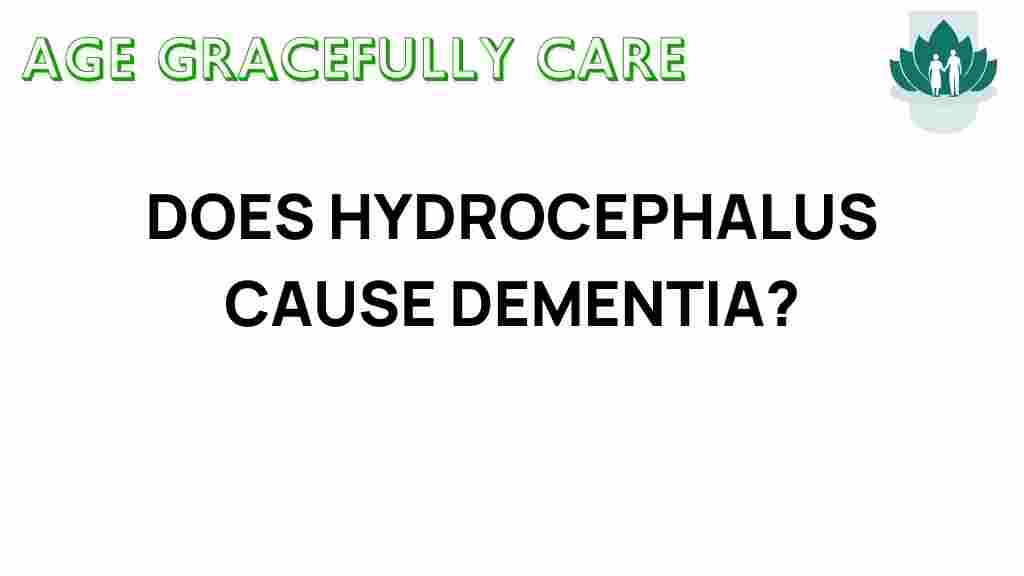Unraveling the Connection: Does Hydrocephalus Lead to Dementia?
Hydrocephalus and dementia are two significant medical conditions that affect brain health. Understanding the relationship between these neurological disorders is crucial for patients, caregivers, and medical professionals. This article delves into whether hydrocephalus can lead to dementia, exploring symptoms, risk factors, treatment options, and patient care strategies.
What is Hydrocephalus?
Hydrocephalus is a condition characterized by an accumulation of cerebrospinal fluid (CSF) within the brain’s ventricles. This buildup can increase intracranial pressure, potentially leading to brain damage and various neurological symptoms.
Understanding Dementia
Dementia is an umbrella term for a range of cognitive impairments that interfere with daily life and activities. Alzheimer’s disease is the most common form of dementia, but other types include vascular dementia, frontotemporal dementia, and Lewy body dementia.
Hydrocephalus and Dementia: The Connection
Research indicates that hydrocephalus can indeed lead to cognitive decline, including symptoms associated with dementia. The mechanisms behind this connection are complex and involve the impact of increased intracranial pressure on brain function.
Symptoms of Hydrocephalus
Recognizing the symptoms of hydrocephalus is vital for early diagnosis and treatment. Common symptoms include:
- Headaches
- Nausea and vomiting
- Blurred vision
- Balance problems
- Changes in cognitive function
Symptoms of Dementia
Dementia symptoms can vary depending on the type but often include:
- Memory loss
- Difficulty with problem-solving
- Language difficulties
- Disorientation and confusion
- Changes in mood and behavior
How Hydrocephalus Can Cause Cognitive Decline
The relationship between hydrocephalus and cognitive decline can be attributed to several factors:
- Increased Pressure: The buildup of CSF can lead to increased pressure on brain tissues, affecting their function.
- Neuroinflammation: Hydrocephalus may trigger inflammatory responses in the brain, contributing to neuronal damage.
- Disruption of Blood Flow: The condition can interfere with normal blood flow, depriving brain cells of necessary nutrients and oxygen.
Risk Factors for Developing Dementia in Hydrocephalus Patients
Certain factors may increase the risk of developing dementia in individuals with hydrocephalus:
- Age: Older adults are more susceptible to both conditions.
- Duration of Hydrocephalus: Prolonged periods of untreated hydrocephalus can increase the risk of cognitive decline.
- Co-existing Medical Conditions: Other neurological disorders can compound the risk.
Treatment Options for Hydrocephalus
Effective treatment of hydrocephalus is crucial in preventing or minimizing cognitive decline. Common treatment strategies include:
1. Surgical Intervention
The primary treatment for hydrocephalus is the surgical placement of a shunt. This device helps drain excess CSF and reduces intracranial pressure.
2. Medications
While there is no medication to cure hydrocephalus, certain drugs can help manage symptoms. These may include:
- Diuretics to reduce fluid accumulation
- Pain relievers for headaches
3. Physical and Occupational Therapy
Post-surgery, many patients benefit from rehabilitation therapies to improve mobility and cognitive function.
Patient Care Strategies
Providing care for patients with hydrocephalus and potential cognitive decline requires a comprehensive approach:
1. Regular Monitoring
Consistent follow-ups with healthcare providers are essential to monitor intracranial pressure and cognitive function.
2. Cognitive Rehabilitation
Engaging patients in cognitive exercises can help maintain brain health and slow the progression of cognitive decline.
3. Support Systems
Establishing strong support systems, including family, friends, and professional care, can significantly enhance the quality of life for patients.
4. Education for Caregivers
Caregivers should be educated about hydrocephalus, dementia, and the associated challenges to provide better support.
Troubleshooting Tips for Caregivers
Caring for someone with hydrocephalus who may experience cognitive decline can be challenging. Here are some troubleshooting tips:
1. Communication Challenges
If the patient has trouble communicating, try to:
- Use simple language and short sentences.
- Encourage them to express themselves through writing or drawing.
2. Managing Behavioral Changes
Behavioral changes may occur with cognitive decline. To manage this:
- Stay calm and patient during difficult moments.
- Engage them in familiar activities to reduce anxiety.
3. Understanding Memory Loss
Support memory retention by:
- Establishing routines.
- Using memory aids like calendars or reminders.
Conclusion
In conclusion, the connection between hydrocephalus and dementia is significant and complex. While hydrocephalus can lead to cognitive decline, early intervention and appropriate treatment can help mitigate these risks. Understanding symptoms, risk factors, and treatment options is essential for patients and caregivers alike. By focusing on patient care and support, we can enhance brain health and improve the quality of life for those affected by these neurological disorders.
For more information on brain health and related conditions, visit Brain Health Foundation. If you are looking for resources on patient care, check out our detailed guides here.
This article is in the category Health and created by AgeGracefullyCare Team
